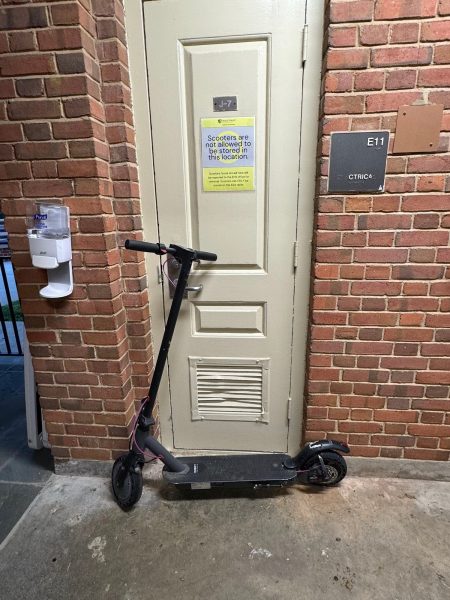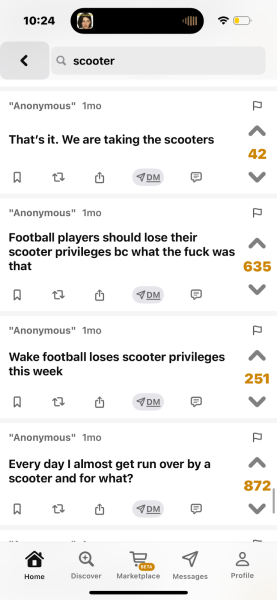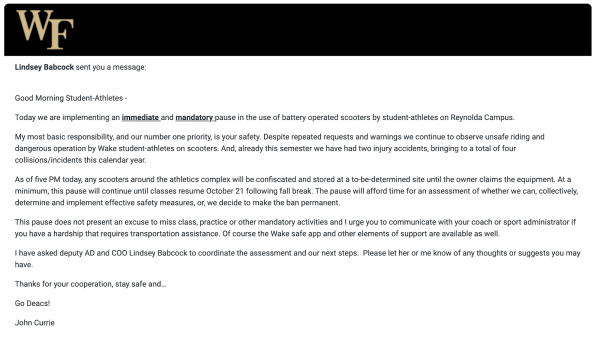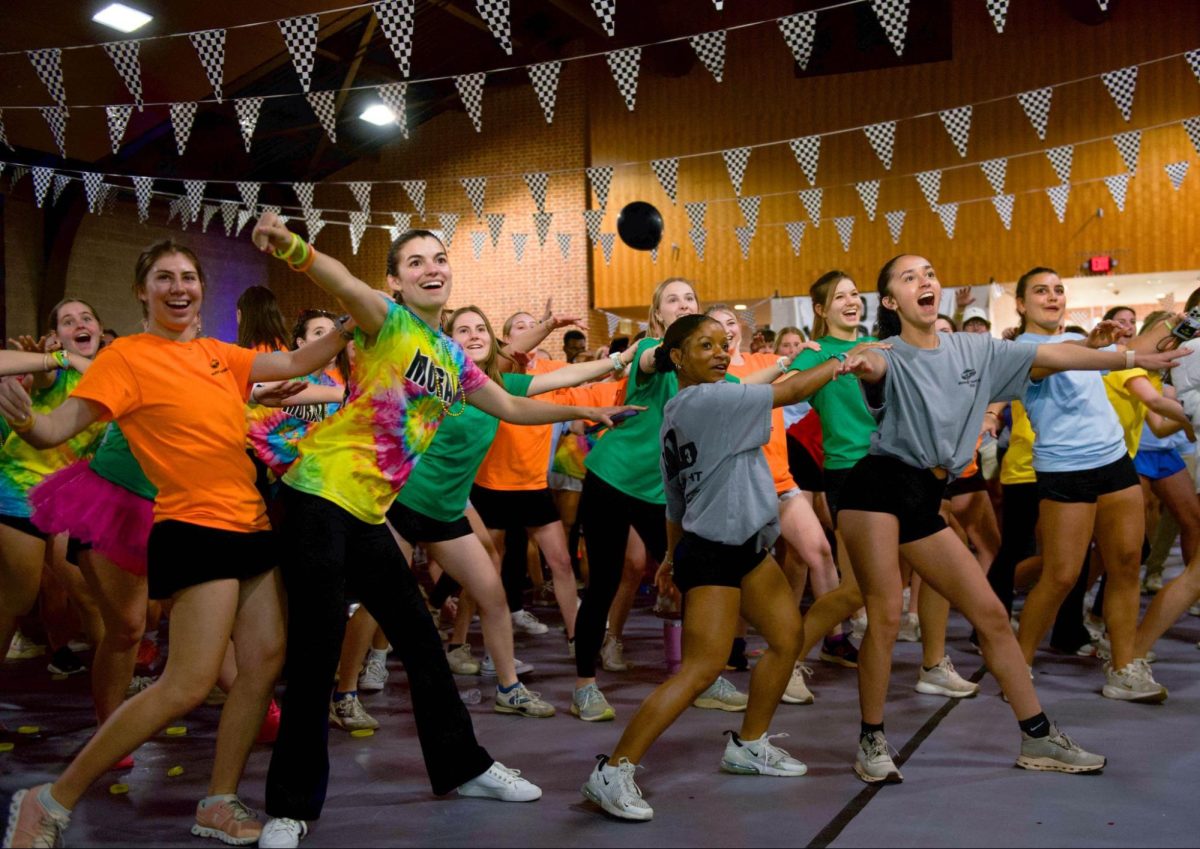Welcome back to Mattie’s “Wake Forest Nature Guide” where I will teach you how to spot an athlete in the wild.
The first trait to observe is the Wake Forest Utility Backpack. This backpack varies in pattern as it includes different player numbers and sports. The next way to spot an athlete is the head-to-toe Wake Forest apparel, rarely spotted being worn by Non-Athletic Regular People (NARPs). You name it: sweatshirts, sweatpants, shorts, t-shirts, tank tops, custom Nike gold shoes. And finally, the biggest indicator that the freshman residence halls are not randomly assigned (they are all parked outside of Angelou) — the electric scooter.

The scooter ban
While most athletes have the privilege of owning scooters, the campus-wide scrutiny has primarily targeted the football team. Who can blame people when the football record has been heartbreaking?
Going into the N.C. State game, Wake Forest had three devastating back-to-back-to-back losses. In week two, the Demon Deacons blew a 13-point lead against the Cavaliers, losing 30-31. During homecoming weekend, Wake Forest got destroyed by Ole Miss resulting in a final score of 40-6. At least we couldn’t lose our bye week before Family Weekend! And finally, the “DOINK” heard around the world. With a last-resort, 42-yard field goal attempt, the Demon Deacons fell to the Ragin’ Cajuns.
In response to this disappointing losing streak, Fizz, a private social media application, where college students can post anonymous polls and comments, was flooded with demands to take away the scooters from athletes.


I guess the prayers of the students were answered after an email to athletes from Athletic Director John Currie. On Sept. 25, student-athletes received the news that there would be an “immediate and mandatory pause in the use of battery-operated scooters.”
“My most basic responsibility, and our number one priority, is your safety,” Currie said. “Despite repeated requests and warnings, we continue to observe unsafe riding and dangerous operation[s] by Wake student-athletes on scooters. And, already this semester we have had two injury accidents, bringing to a total of four collisions/incidents this calendar year.”
The ban will be in effect until Oct. 21 to give student-athletes time to reflect on unsafe scooter usage. At the end of the email, he emphasized that this “pause” should not keep students from getting to their classes and practice on time.

The ban is being taken very seriously (not)
I don’t know about y’all, but I still have scooters whipping by me throughout the day. As hinted by the email, athletes are still able to ride their scooters around campus as long as they do not bring them to the athletic facilities. If found at the athletic facilities, the scooter will be “confiscated and stored at a to-be-determined site until the owner claims the equipment.”
Wow — this is a weak ban. However it does bring up a very real question: do the risks outweigh the benefits of giving student-athletes scooters?
The athlete perspective
I spoke to Abby Stankus, a high jumper for the Wake Forest Track and Field team, to get the athlete’s perspective on electric scooters. Stankus does not own a scooter herself.
“I’m pretty scared of them,” Stankus said. I feel like I could hit a rock or curb and fall off. I’ve seen so many people fall or slip off theirs, so they scare me in that way.”
Abby explained that despite several emails warning athletes of possible repercussions for unsafe scooter use she was surprised the ban actually took place as they are “fundamental to the athlete culture,” Stankus said. “I think on each team, at least more than half of the athletes have a scooter.”
While Stankus recognized the dangers of the scooters and how that has impacted her own reasons for not having a scooter, she emphasized her support of their use.
“I don’t think scooters should be banned because the athletes used their own money to buy the scooters, so they are technically their property,” Stankus said. “In addition, athletes have such tightly packed schedules that it is not feasible for most athletes to have to walk across campus all day.”
To the polls!
To take a closer look into whether scooters should be allowed on campus, I took to the site of the slander, Fizz. I asked students, “Should the athletes be able to have electric scooters?” In the response categories, I accounted for athlete and non-athlete perspectives.
Out of 636 responses, 67% of respondents believe that athletes should not have scooters. This percentage consisted of 389 non-athletes and 40 athletes. But who cares what the campus thinks? After all, this is my opinion piece.
My opinion
I can see both sides of the argument. First of all, athletes do purchase these scooters themselves and decide that the risks associated with this mode of transportation do not outweigh the benefits. According to a study done by the NCAA, D1 athletes dedicate about 33 hours to athletics on top of 35.5 hours of academics per week. I can understand that there are only so many hours in the day and cutting transportation time can make it more doable. So if athletes want to take on the personal risks associated with scooters to cut transportation time across campus, why shouldn’t they be able to use them?
My issue with the scooters is that these are legit vehicles that can go up to 25 mph.
This is the speed limit on campus, and scooters are commonly ridden on ramps and sidewalks. I am from Charlotte, N.C. and scooters have become a large safety issue uptown. In 2019, the Charlotte Mecklenburg Police Department released a statement saying that electric scooters may not be ridden on sidewalks and must obey all traffic laws (stop signs, traffic lights, yielding to pedestrians, etc). Considering that 90% of electric scooter incidents occur off the roadway, I think putting regulations in place to keep electric scooters off of sidewalks and enforce traffic laws is a great compromise.
Another proposal I have is to introduce an alternative electric transportation option: the Barbie Jeep Wrangler. These babies have not one but two speeds: “turtle” and “rabbit.” They even go in reverse! With a max speed of 5 mph, these will get athletes to class and practice without compromising safety.
But seriously, scooters do not need to be banned on campus, but safety regulations must be implemented. Scooters should not be allowed on sidewalks and riders need to obey campus traffic laws.
And if all else fails — there’s always my Barbie Jeep idea.










